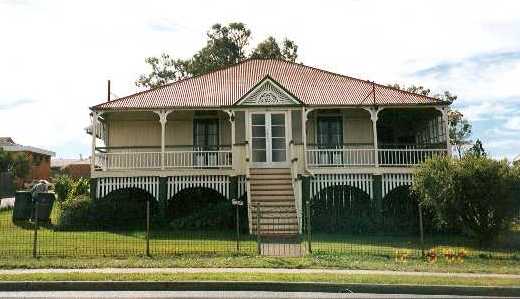Addresses
Type of place
House
Period
World War I 1914-1918
Style
Bungalow
Addresses
Type of place
House
Period
World War I 1914-1918
Style
Bungalow
‘Cliftonvilla’ was built in 1916 in the Zillmere farming district for railway worker William Price. At that time Zillmere was the most important railway station for the outer northern suburbs of Brisbane. ‘Cliftonvilla’ is one of the few remaining examples in the wider Zillmere district (which includes the modern suburbs of Aspley, Geebung, Carseldine, and parts of Boondall and Virginia) of a largely intact Federation Bungalow style house.
Also known as
The Price House
Lot plan
Key dates
Local Heritage Place Since —
Date of Citation —
Construction
Roof: Corrugated iron;Walls: Timber
Criterion for listing
(A) Historical; (B) RarityInteractive mapping
Also known as
The Price House
Lot plan
Key dates
Local Heritage Place Since —
Date of Citation —
Construction
Roof: Corrugated iron;Walls: Timber
Criterion for listing
(A) Historical; (B) RarityInteractive mapping
History
Prior to World War One, William Henry Price, had worked around central Queensland as a chainman for the Department of Railways, where he assisted surveyors who were laying new track in that part of the state. Disgruntled with their itinerant existence and with two young daughters (May and Lillian) to look after, Price’s wife Augusta pressured her husband to find more permanent accommodation for the family than a Department of Railways’ tent.
Thus c1911, the family looked for property around Brisbane and William Price obtained one acre, three roods and two and one quarter perches of land in the northern Brisbane farming district of Zillmere. He transferred the property, described as re-subdivision 6 of subdivision B of Portion 222, to his wife Augusta Mary Louisa Price (Beckmann) on 2 April 1911. The Beckmann Family were Zillmere pioneers and Price inherited the land from his wife’s family.
The Price family wanted to build their family home on this vacant block of land that was within close walking distance of Zillmere Railway Station. By 1911, Zillmere had become a major Brisbane railway station, servicing the large J.C. Hutton’s ham and bacon factory located on Zillmere Road. Zillmere station also had a telegraph office, a railway crossing loop, duplicated rail lines and a signal cabin. Railway worker William Price may have been attracted to settle in the Zillmere district because of the possibility of finding work there and because his wife had family there.
Due to his work commitments, William Price was unable to move his family to Brisbane until 1915. He then paid cash to a Chermside building contractor, an old German named Hermann, to begin construction of the family home. William Price asked for his home to be built in the Federation style. In particular, William asked that the house’s interior be decorated with a kangaroo and emu motif in all the fretwork and he had told his children that this was because neither Australian mammal could move backwards, just like the recently federated Commonwealth of Australia. The fretwork was also a way of teasing his wife Augusta who had never been impressed with living in railway bush camps surrounded by wild animals such as kangaroos and emus.1
While their Zillmere home was being constructed, the Price family were invited by a Department of Railways engineer, Mr. G.C. Wilcox, to housesit his New Farm residence ‘Wynburg’, that had once been the home of the Roman Catholic Archbishop of Brisbane.
‘Cliftonvilla’ was completed in 1916, and the Price family moved into their new home on April Fool’s Day (1 April) 1916. William Price named the family home ‘Cliftonvilla’ after his own British place of birth of Clifton in Wales.
William’s only son, William (known as Bill) was born at ‘Cliftonvilla’ in 1917. On 17 December 1969, the property was passed to the Price children Evelyn May Price, William (Bill) Henry Price and Lillian Joan Lever. May and Bill Price continued to live at their family home of ‘Cliftonvilla’ until their deaths in the first decade of twenty-first century.
Statement of significance
Relevant assessment criteria
This is a place of local heritage significance and meets one or more of the local heritage criteria under the Heritage planning scheme policy of the Brisbane City Plan 2014. It is significant because:
References
-
Ford, Jonathan (Jack), Marching to the Trains – the Chermside Army Camp Remembered, (Brisbane, Jack Ford, 2006), p15
-
Brisbane City Council, Properties on the Web, website, post-1946 building cards
-
Brisbane City Council, 1946 aerial photographs.
-
Brisbane City Council’s Central Library, local history sheets
-
Department of Natural Resources, Queensland Certificates of title and other records.
-
Ford, Jonathan (Jack), Marching to the Trains – the Chermside Army Camp Remembered, (Brisbane, Jack Ford, 2006)
-
Geebung/Zillmere RSL and Brisbane City Council, Geebung/Zillmere RSL Remembrance Corner Project Oral Interview Transcript, “ Interview with Bill Price and May Price conducted by Dr Jack Ford and Dr Sue Keays on 9 December 1997
-
John Oxley Library, Brisbane Suburbs – Estate Maps
-
Kerr, J 1988, Brunswick Street, Bowen Hills and Beyond: the Railways of the Northern suburbs of Brisbane, Australian Railway Historical Society, Brisbane
-
"Historic house stays”, Northside Chronicle, 3 December 2008
-
Queensland Post Office Directories, 1868-1949
Citation prepared by — Brisbane City Council (page revised June 2022)

